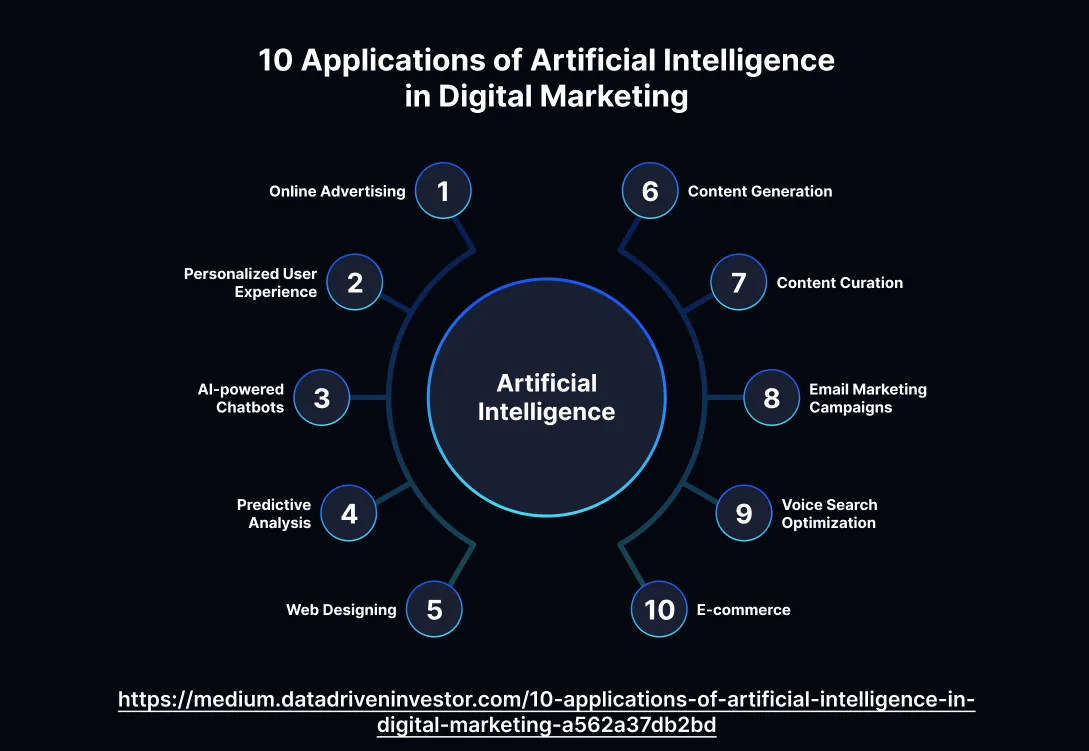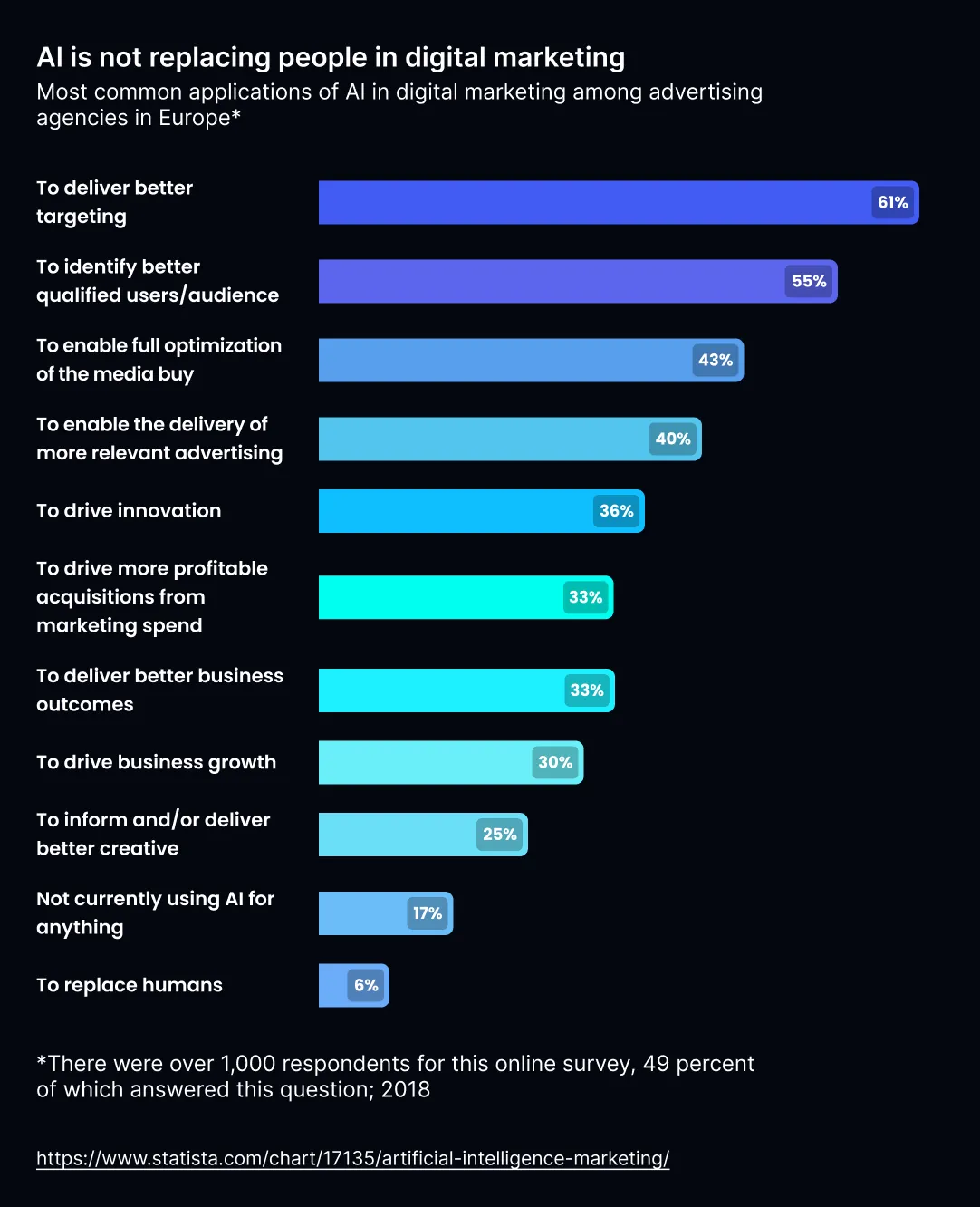The swift adoption of artificial intelligence (AI) technology across many industries shapes how businesses interact with their target audiences and gain clients’ trust. Algorithm-based tools have a variety of uses in different spheres, which raises questions about the future of AI in digital marketing. Companies that learn how to leverage the power of AI get a competitive edge by creating personalized offerings, converting leads to sales effectively, and discovering new ways of predicting buyers’ behavior.
What Is the Future of AI in Digital Marketing?
This technology is expected to fully transform the industry. Task automation enables firms to reduce the time spent on routine operations and allocate resources to research and development. AI opens new horizons to firms seeking to expand their scope of operations.
Marketing professionals deploy AI to provide custom recommendations, facilitate search, and enhance communication. Building loyalty necessitates improving customer experience (CX). Using AI, 46% of enterprises enhanced CX. Besides, 45% of companies made advertising campaigns targeted.
In the coming years, the role of artificial intelligence in marketing is expected to increase, as specialists working in this sphere will have to process large volumes of data. Custom-built software leverages Large Language Models (LLMs) and conversational AI making it easier for marketers to discover actionable insights and tailor their efforts.
Trusted providers such as MetaDialog develop AI support platforms designed to automate up to 87% of conversations. AI models analyze feedback and improve performance over time. Personalization is the key to winning customer trust and enhancing CX.
Analyzing the purchase history, AI bots generate recommendations relevant to buyers’ needs. Event marketers do not have to wait too long until attendees’ feedback gets analyzed. Using AI, they monitor engagement during an event and adjust advertising strategies to achieve better results.
Besides data processing, AI has demonstrated its effectiveness in content generation. AI-powered software can reformat long videos and documents to produce short and easy-to-digest articles automatically. In the future, the role of AI in the industry will become more prominent, when new use cases are discovered.
How Does AI Change Digital Marketing?
Creating a personalized online experience is a prerequisite to success as it enables businesses to establish trusting relationships with clients and entice them with targeted offerings. With the proliferation of mobile apps, it became easier to reach out to potential customers and drive them to place an order.
The development of AI products has taken the world of digital marketing by storm. Companies invest in the industry to provide customers with high value for money and cater to their needs and preferences. Below, we have briefly outlined two ways marketing automation has changed the industry.
Advanced predictive analytics tools
Before the AI era, professionals had to rely on basic features to analyze client behavior patterns and track the effectiveness of advertising campaigns. The development of powerful products capable of analyzing key metrics and identifying crucial changes in buying habits symbolized an important shift in marketing.
The future of AI in digital marketing lies in affordable solutions that answer clients’ needs. Such companies as MetaDialog recognize the significance of building powerful tools capable of detecting signs of discontent, getting insights about preferences, and analyzing information.
Using high-accuracy LLMs, firms identify trends and make decisions based on measurable data. Instead of investing in computing resources, enterprises can access cloud services and task third-party providers with building custom AI systems with predictive analytics tools. Trained to handle massive datasets, AI assistants optimize marketing processes and make realistic predictions impacting strategic decisions.
AI-driven content generation
This trend has gained prominence in recent years. Using dedicated tools to write emails in a consistent style that matches a brand’s voice allows marketers to spend less time on newsletters and send automated reminders in multiple languages.
Image generation has made some advancements as well, while services designed to create videos based on text prompts have become more powerful. In the future, digital marketers will entrust AI systems with many content-generation tasks and engage with customers.
Use Cases of AI in Digital Marketing

Large corporations began to invest in AI services to expedite task completion and make their efforts targeted. They utilize machine learning (ML) to build custom tools that solve problems independently and improve performance based on analyzed data.
Marketers employ ML to perform various tasks:
- Accurate ad targeting
- Lead generation
- Search engine optimization
Popular social media rely on AI algorithms to provide users with content relevant to their preferences. ML enables marketers to categorize clients based on specific criteria, including the following:
- Shopping habits
- Demographics
- Purchase history
Using the result of such an analysis, a company can generate targeted emails or social media content. In addition, eCommerce businesses have started to deploy pre-trained AI bots to improve the quality of their interactions with clients. Below, we have considered some other ways enterprises use algorithm-driven tools.
Voice search
The development of AI led to the emergence of voice assistants relying on ML and natural language processing. They recognize speech patterns and react to clients’ requests helping them finalize orders.
Customers utilize virtual helpers when browsing large online stores. Such tools enable them to find products, get relevant recommendations, and access detailed information about listed items.
As 62% of U.S. citizens already use voice assistants, businesses should focus on this trend and invest in effective tools that facilitate shopping and other tasks.
Chatbots
Virtual helpers analyze queries and generate replies 24/7, significantly improving the effectiveness of CS teams. MetaDialog builds bots that can improve customer satisfaction by 28% and increase an average response speed by two times.
Retailers can benefit from using dedicated bots to answer common queries as it allows them to reduce workload and address customers’ concerns promptly.
Marketing automation
Marketers use AI to produce tailored content and deliver it to users when they have time to read it. AI services facilitate personalizing marketing efforts, increasing ROI, and devising cost-effective strategies. After analyzing information about buyers’ behavior, specialists use advanced targeting techniques.
Is It Possible to Utilize AI to Fully Automate Digital Marketing Tasks?

Regardless of their sizes, companies keep looking for ways to optimize expenses. The emergence of AI signified a pivotal shift, as firms no longer need to expand staff to deal with increased requests. Instead, they rely on algorithm-based solutions to expedite workflows and boost productivity.
While many critics of the technology voice concern about the fact that AI bots may gradually replace human employees, marketers have nothing to fear. On the contrary, AI tools will enable them to spend less time on routine operations and increase the efficiency of their efforts.
Complex AI systems require human supervision and occasional intervention. By adding employees to the loop, firms can monitor the performance and adjust campaigns to achieve the desired objectives. Specialists interested in personal growth should experiment with AI to discover its benefits and perform the following tasks quickly:
- Find relevant keywords
- Optimize aids
- Set up newsletters
- Generate engaging content
Implementing AI opens a pathway to creativity and enables specialists to demonstrate a high level of competence, get recognition, and advance their careers.
Tips for Implementing AI in Marketing Campaigns
Without hiring a team of experienced engineers, it may be arduous and time-consuming to integrate AI platforms with legacy systems. Finding a reliable provider enables firms to reduce costs and utilize AI to foster innovations. LLMs change the way major businesses operate. They facilitate search, which drives users to deploy them instead of relying on traditional options like Google.
Adopting AI in the early stages gives digital marketing teams an edge. It expedites content generation and enables employees to utilize predictive analytics tools. MetaDialog’s LLMs increase a team’s productivity by up to 5 times, which demonstrates the effectiveness of such systems. Ignoring the significance of AI may lead to obscurity and financial ruin.
HubSpot, Zapier, and other top companies have already embraced AI and streamlined pipelines. A strong focus on hyper-personalization, enhanced CX, and optimized processes allows enterprises to launch result-yielding campaigns across multiple channels, including social media.
In the coming years, AI will be well-positioned to transform search marketing. People increasingly often utilize other tools besides search engines to discover new products. Staying aware of this trend is necessary to devise effective digital marketing strategies.
Addressing Common Challenges
Making the most of AI requires digital marketers to solve widespread issues resulting from expedited adoption and limited knowledge of the technology. Most companies deal with such problems:
- Compromised security: Adhering to privacy regulations when using AI is challenging unless a firm trains LLMs using high-quality datasets. Adding an extra layer of protection is necessary when deploying AI systems. Such models collect user data and process it to extract valuable insights. Preventing third parties from getting unauthorized access to this information is necessary to ensure transparency and compliance.
- Integration with old systems: AI tools may be incompatible with some programs and services.
- Hallucinations: When creating content, marketers should double-check texts written by AI to eliminate errors and remove inaccuracies. Even though modern AI models generate content resonating with the needs of a target audience, they cannot fully replace human writers, so it is recommended to deploy them under supervision.
- Advanced skills: Marketers should educate themselves on AI technology to deploy LLMs with maximum efficiency.
- Bias: Ethical usage of AI necessitates utilizing user data responsibly and raising awareness of potential biases that may affect a brand’s relationship to its clients. Hyper-targeting may put off some leads, as they may decide that a company spies on them online.
- Copyright: The developers of widely-used AI tools are criticized for irresponsible usage of publicly available data. Maintaining transparency and deploying custom AI systems, like the ones built by MetaDialog, is the only way to avoid reputation risks.
Companies that intend to expand their market presence should consider these issues when utilizing AI for maximum gain. MetaDialog strives to expedite the adoption of AI and designs top-grade systems trained on huge volumes of data. Working with enterprises from various industries, it listens to clients’ concerns and builds excellent products to help them get an edge.
The future of AI in digital marketing is bright, as many companies demonstrate a willingness to invest in algorithm-powered tools. Such solutions enable them to improve the quality of customer support services, enhance CX, and follow responsible data usage approaches. However, implementing AI products without the assistance of experienced engineers may be arduous, expensive, and time-consuming. Contact our team today and learn how to use AI to ensure the stable growth of your business.
